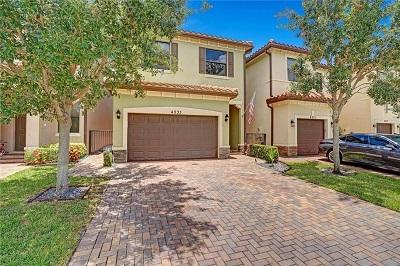Mortgage Case Study: Home Loan for Restaurant Owner
Learn about how a business owner got approved for a cashflow home loan.
Qualifying for a traditional mortgage can be more challenging when an individual is self-employed. It wasn't always this way, but since the financial crisis, new rules came into place changing the requirements for business owners to purchase a home.
Here's a case study of to help you better understand the situation:
A few years ago, a business owner, who happened to be an owner of a restaurant wanted a mortgage. He actually owned a property valued at $950,000 at the time which was free and clear. He previously lived in New Jersey where he was a partner in a large scale business. He had purchased this luxury Florida condo several years prior with cash and eventually moved into it.
As an entrepreneur, he opened a new business which happened to be a restaurant. Soon after, he opened a second location. It seemed that his business was in a good position overall. However, when he wanted to obtain a mortgage to purchase another property, he did not understand why he kept being denied. In fact, he had been denied three times by three different banks beforehand.

When we spoke to him to better understand his situation, he explained his credit was overall good, he had two locations producing strong revenue and he was only looking for about a $300,000 to $400,000 loan and would pay the remaining balance in cash on another property he wanted to buy.
Since he was a business owner, we knew that mortgage underwriting would require two years of tax returns. When you are self-employed, a traditional mortgage will typically need two years of the personal tax returns and two years of the business tax returns. We discussed this with him, and reviewed his documents. While there was a good amount of revenue, he also had many deductions which were understandable considering he had rent, employees, advertising and food costs. These business expenses reduced his net profit and his bottom line did not show income enough to qualify for a mortgage.
Keep in mind that he also owned his current property, and had no plans to sell it. Even though that property was free and clear, he still had a monthly HOA fee and property taxes which had to be accounted for. In his case, the insurance was included with the condo HOA.
The bottom line was that he would not be able to qualify for a traditional mortgage.
Next, we examined his monthly revenue over a certain period of time. We noticed the monthly sales of even one location were large enough amount that we could help him. After reviewing one year's worth of business cashflow, we saw one single restaurant location was generating over $30,000 per month in revenue. This can easily be derived from funds being deposited into a business bank account. Credit card transactions, cash and even checks which get deposited into the bank account will get reviewed, analyzed and utilized to help the business owner, who in this case was a restauranteur.
Through a home loan program specifically designed for business owners, we could avoid tax returns and focus more on the business cashflow.
The $30,000 in average monthly revenue for a sole business owner could potentially qualify the individual as if they had $180,000 in income we can use. Depending on the person's liabilities such as car payments, personal loans and other debt that may appear on the credit, we can approximate that an individual in this situation could suddenly qualify for about a $600,000 to $800,000 loan without the need for tax returns. This certainly will vary from business owner to business owner as each individual has different credit, different liabilities, etc.
For this restaurant owner, he was focused on taking funds out of his current property to buy another. Since it was valued just below one million dollars and had no mortgage, he could easily take a few hundred thousand dollars from it, using the business cashflow we calculated, and use the funds to purchase another property. That's exactly what he did as we helped him obtain a self-employed home loan!
Here are some of the highlights to help understand basic criteria needed:
Self-Employed Mortgages
No Tax Returns Required
No W2s Required
No Paystubs Required
Minimum 10% Down Payment
Fixed 30 Year Mortgage Options
Primary Residence, Second Home or Investment Property
Multi-Units Options
Purchase or Refinance

While many business owners may have different scenarios, its important for our team to review each file individually. We can then provide the attention needed to help you with your residential financing needs.
Contact us to learn more about self-employed home loans and other residential mortgage programs to help you.
Mortgage Insight:
Purchasing a Home with a Conventional Loan
VA Loan Success Story with Eric and Denise
How a VA Loan in Ocala, FL changed a Family's Financial Future
Can I Use My VA Loan in a Chapter 13 Bankruptcy?
Can a Fiance or Kids be on a VA Loan?
Veterans Who Buy Homes See Far Higher Net Worth Than Renters
How Much Mortgage Insurance Can I Save with a VA Loan?
Duplex Property in Fort Lauderdale Quadruples in Value and Leaves a Nest Egg to the Heirs
How a California Remote Worker Obtained a Mortgage to Relocate to Boca Raton, FL
What's the Average Mortgage in Fort Lauderdale, FL?
What Factors are in my Credit Score for a Mortgage?
What Documents Do You Need for a No Income Verification Mortgage?
Restaurant Owner Obtains Self-Employed Home Loan
Can a General Contractor Obtain a No Income Verification Mortgage?
Is a HELOC or a Cash Out Refinance Better to Pay for a New Roof?

Your mortgage journey.
Various loan type options including:
Conventional loan
FHA loan
VA loan
Self-employed loan options
No income verification for investors
Benefits of Homeownership
Homeownership is a significant milestone and a decision that offers many advantages. In addition to providing a place to call your own, owning a home brings financial stability, personal fulfillment, and a sense of belonging. Mortgage Group has been helping individuals and families obtain homeownership, guiding them through the process and obtaining referrals to help their family and friends accomplish the same.

Purchase
Get pre-approved to purchase your first home, second home or upcoming investment property.
Refinance
Own a property and interested in lowering your payment? Need to take cash out? Refinance with confidence.
Connect with Us
Our experienced team with be happy to speak with you, and walk you through each step of the process.

Providing mortgage solutions to help you with your home.
Mortgages can be complicated and have many moving parts. Let our team help you!
Contact Us
It only takes a few moments to reach out and have an initial conversation.
Know the Next Steps
Our team will work with you to find the best way to achieve your home loan goals.
Find Your Home and Get Your Loan
Our team will be prepared to move with the next steps once you have secured your home purchase contract.
Houses

Townhomes

Condos

Multi-Units

Some of the areas where we have helped individuals obtain a mortgage:
Miami-Dade County
Bal Harbour, FL
Coconut Grove, FL
Coral Gables, FL
Cutler Bay, FL
Eastern Shores, FL
Fisher Island, FL
Golden Beach, FL
Hialeah, FL
Hialeah Gardens, FL
Homestead, FL
Indian Creek, FL
Miami Beach, FL
Miami Gardens, FL
North Miami, FL
North Miami Beach, FL
Pinecrest, FL
Surfside, FL
Broward County
Cooper City, FL
Coral Springs, FL
Dania Beach, FL
Davie, FL
Deerfield Beach, FL
Doral, FL
Fort Lauderdale, FL
Hallandale Beach, FL
Hollywood, FL
Lauderdale by the Sea, FL
Lauderdale Lakes, FL
Lauderhill, FL
Lighthouse Point, FL
Margate, FL
Miramar, FL
North Lauderdale, FL
Oakland Park, FL
Parkland, FL
Pembroke Pines, FL
Plantation, FL
Pompano Beach, FL
Southwest Ranches, FL
Sunrise, FL
Tamarac, FL
West Park, FL
Wilton Manors, FL
How much home can I afford?

Which home loan program is right for me?

Contact our team today.
1-800-583-5305
© Copyright 2025 E Mortgage Capital, Inc.. All rights reserved.
- 1416824 | E Mortgage Capital, Inc.
Notice To Texas Loan Applicants: Consumers wishing to file a complaint against a mortgage banker, or a licensed mortgage banker residential mortgage loan originator, should complete and send a complaint form to the Texas Department of Savings and Mortgage Lending, 2601 North Lamar, Suite 201, Austin, TX 78705. Complaint forms and instructions may be obtained from the department’s website at www.sml.texas.gov
A toll-free consumer hotline is available at 1-877-276-5550. The department maintains a recovery fund to make payments of certain actual out of pocket damages sustained by borrowers caused by acts of licensed mortgage banker residential mortgage loan originators. A written application for reimbursement from the recovery fund must be filed with and investigated by the department prior to the payment of a claim. For more information about the recovery fund, please consult the department’s website at
www.sml.texas.gov

